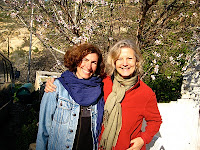Here in Amman, Jordan I meet people every week who ask a question I’ve heard since girlhood: “Mehdi? Are you Mohammad Mehdi’s daughter?” From ministers to media
 professionals, doctors and non-governmental activists comes admiration for this man who didn’t back down when times got tough. “I knew him in Beirut,” said one newsman. “He spoke for all of us,” admits a successful banker, “when we were too scared to speak up.”
professionals, doctors and non-governmental activists comes admiration for this man who didn’t back down when times got tough. “I knew him in Beirut,” said one newsman. “He spoke for all of us,” admits a successful banker, “when we were too scared to speak up.”When I was a little girl being known as Mehdi’s daughter had some unwelcome consequences. A teacher would ask “Are you –“ and then dock my grade because he didn’t like my father’s politics; the parent of a friend would say “Was that your father on television last night?” and warn her daughter I wasn't the kind of girl to play with.
Today is the 12th anniversary of my father’s sudden and untimely death. I was with him outside the Consulate of Saudi Arabia in New York City, picking up my papers for permission to cover the Hajj for PBS, when he was struck with massive coronary failure. It was over in seconds. But the impact of his passing continues daily, as I meet people who remember him, and as all lament the absence of his voice on the issue of Palestine.
Mohammad Taki Mehdi came to the United States from Iraq in 1949 to study at the University of California at Berkeley. “I was born in Baghdad and reborn in Berkeley,” he repeated to all who would listen. It was easier to say "Baghdad" than Karbala -- at that time rare indeed was the American who'd heard of Karbala. At least those who'd heard of Scheherezade knew of Baghdad. Now, one blessing of the cursed war against Iraq is that more Americans have heard of Karbala. Either way, back in the 1960s most everybody only heard my dad's criticisms of Israeli policy and thought he was anti-Semitic.
Dr. M. T. Mehdi is best known for his strong pro-Palestinian and anti-Israeli stance. He was a one-man public relations machine to whom all the New York press turned whenever violence broke out in the Middle East. He commented on Munich, Ma’alot, and the Marine barracks bombing in Beirut. He played a role in getting American hostages released from Lebanon. In 1988 he wrote Terrorism: Why America is The Target – five years before the first World Trade Center bombing.
He is less well known for running for the US Senate in 1992, becoming the first Arab American Muslim to run for federal office. He won 5% of the vote in New York State. Dr. Mehdi was the first American to petition the US Post Office for an Eid Stamp. He got the Empire State Building to go green in honor of Ramadan. He was the first to encourage other major public institutions, including the Port Authority of New York and New Jersey to acknowledge the accomplishments of Muslims by raising a crescent and star flag annually in December. In fact, the Port Authority raised this banner at the World Trade Center at his behest. A crescent and star is on the White House ellipse every year during the holiday season alongside the National Christmas tree and menorah representing the Jewish festival of Hanukah. He was the first Arab American to publish an English-language newspaper (ACTION) focused on American and Middle East issues, influencing the career choices of young Arab Americans. He was the first to face unfair deportation based on his pro-Palestinian politics and national origins.
In the time that’s passed since my father’s death, progress has been made in the vital mines of politics and culture that he forged nearly single-handedly. Today, Arab American and Muslim American organizations plow forward, holding conferences, raising funds, challenging the status quo. We hear annual Ramadan greetings from the White House and can purchase the beautiful blue and gold calligraphic Eid stamp. There’s still a long way to go in balancing American policy toward Israel and Palestine and in supporting the growth of democracy in Southwest Asia, but at least it’s on the agenda. Congressman Keith Ellison and others are urging President Obama to “ensure that the legitimate needs of the Palestinian population are met.” But people forget on whose broad shoulders they stand.
There’s no replacing the voice that always came on the radio and television after an explosion, kidnapping, hijacking or killing: a voice that came to put context and reason where only conflict and rage prevailed; a voice with rolling “r’s” and an accent echoing a boyhood in Baghdad and a manhood in Berkeley. A man who suffered for his convictions but never lost heart. He survived beatings, arson and threats to his family. He created a movement which lives on now in structured Arab and Muslim American organizations.
“Are you Mehdi’s daughter?”


 my cousin's daughter, Nadia from London, and my niece, Maeve from Canada. I'm not complaining about Petra twice in one month or revisiting Amman's non-tourist hotspots, like El Quds Restaurant for mansaf, or Habiba's for kanafe. Waiters at Hashem's recognize us by now and they really appreciate the 1/2 JD tip on the 4JD meal that leaves us stuffed with falafel and hommos.
my cousin's daughter, Nadia from London, and my niece, Maeve from Canada. I'm not complaining about Petra twice in one month or revisiting Amman's non-tourist hotspots, like El Quds Restaurant for mansaf, or Habiba's for kanafe. Waiters at Hashem's recognize us by now and they really appreciate the 1/2 JD tip on the 4JD meal that leaves us stuffed with falafel and hommos.



